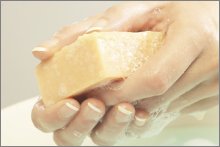Dangerous MRSA Bacteria Now Killing More People Than AIDS in the USA: Here is How to Avoid It
by www.SixWise.com
Methicillin-resistant Staphylococcus aureus (MRSA), once
an obscure illness confined to a spattering of hospital intensive-care
units, has become a household word.
|

Kids who participate in contact sports like football
and wrestling are at an increased risk of MRSA because
of the close skin-to-skin contact and potential for
cuts and abrasions.
|
Though still mostly hospital-acquired, MRSA is spreading,
and reaching epidemic levels in certain parts of the United
States, such as Atlanta, Los Angeles and Texas.
A recent study by the U.S. Centers for Disease Control and
Prevention (CDC) found that MRSA caused 94,000 life-threatening
infections in 2005, and 18,650 people died from it that year.
Deaths from MRSA have now outpaced those from another deadly
epidemic, AIDS. In 2005, about 16,000 people died from AIDS.
The report also revealed some of MRSA's concerning trends:
-
About 15 percent of invasive MRSA infections occurred
among people who had not been in a hospital or health
care setting.
-
Of the 85 percent of infections that could be traced
to hospitals or health care settings, two-thirds appeared
after the patient was no longer hospitalized.
-
People over the age of 65 were four times as likely to
get an MRSA infection than people of other ages.
Meanwhile, outbreaks of MRSA are now occurring in schools.
Students in at least six states have become infected, and
three of the children have died.
The MRSA Superbug
MRSA is called a superbug because it's resistant to many
antibiotics, making it extremely difficult to treat. Not only
is MRSA resistant to methicillin, which includes penicillin
and related antibiotics, but it's beginning to become resistant
to newer antibiotics as well.
While it's not uncommon for people to carry MRSA on their
skin -- about 30 percent of people do -- the bacteria has
become problematic because of the overuse
of antibiotics in the United States, in both human use
and the routine feeding of antibiotics to livestock, which
you then ingest via your food and water. This has caused the
bacteria to mutate into one that is a challenge to control.
If you carry MRSA on your skin without being sick (which
happens regularly), you are said to be "colonized"
with the bacteria. Though you may not be affected, you can
pass the germs on to others.
Meanwhile, about 12 million people receive treatment for
skin infections caused by MRSA each year, according to the
CDC's Jeff Hageman.
Most of these skin infections are minor and are treated by
draining the site of pus and bandaging it, however some progress
into life-threatening infections. While minor MRSA skin infections
often heal on their own without drugs, those that spread are
typically treated with the antibiotic vancomycin, which is
one of the few left that is still effective against resistant
bacteria.
|

Washing your hands regularly is your best defense against
MRSA, and other infectious diseases.
|
It's not entirely known why some MRSA infections are minor,
while others can be deadly, however certain factors can increase
your risk of infection, including:
-
A compromised immune system
-
Age (the elderly and children are more at risk)
-
Certain invasive medical procedures such as catheterization,
dialysis and feeding tubes
-
Recent antibiotic use
-
A recent hospitalization or living
in a nursing home
-
Living in crowded conditions, such as in the military
or in prison
-
Participation in contact sports (the bacteria can spread
via skin-to-skin contact and through abrasions)
-
Living with someone who works in a health care setting
What to do to Reduce Your Risk of MRSA
As hard as MRSA is to treat, the best method to prevent it
is simple. The most effective measure you can take to reduce
your risk of this deadly infection involves simple hygiene,
and particularly hand-washing
with soap and water.
You should wash your hands regularly, for at least 15 seconds,
and use a hand sanitizer for times when you don't have access
to soap and water.
You can further minimize your risk of catching contagious
illnesses by using PerfectClean
Hand Wipes. They're small enough to carry in your pocket,
purse, or child's backpack, yet effective enough to kill contaminants
that can't be seen with the naked eye.
You can use them wet or dry to effectively remove germs from
your hands, such as after a handshake or before eating. And
because they're made of highly durable ultramicrofiber cloth,
you can use them for 100+ washes before you need to replace
them -- making PerfectClean Hand Wipes incredibly economical
for everyday use.
Be sure to share PerfectClean wipes with your children, too,
and teach them to wipe their hands regularly throughout their
school day. MRSA spreads from skin-to-skin contact, and also
via personal items, so using the following common-sense tips
will also help protect you and your family from MRSA. Be sure
to share these tips with your school-aged children and teens,
as they're often the ones who are inclined to share items
they shouldn't.
-
Don't share personal items such as towels, sheets, razors,
clothing or athletic equipment.
-
Take a shower right after athletic games and practices.
-
Wash gym and athletic uniforms and clothing after each
use.
-
Keep any cuts you have covered with a bandage until they
heal.
Signs that a skin irritation may be infected with MRSA include
skin redness, swelling, warmth, tenderness, pus drainage and
sometimes fever. If you think you may be infected, see your
doctor to get tested for MRSA.
Recommended Reading
6
Types of Very Common Toxic Bacteria You Need to Avoid, and
Where They're Typically Found
The
Nine Grossest Things Other People Do That Can Make You Sick
Sources
Journal
of the American Medical Association October 17, 2007;298:1763-1771.
MayoClinic.com
MedicineNet.com
October 19, 2007